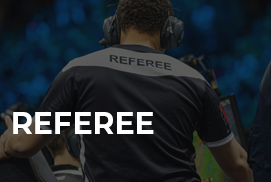

As esports continues to grow in popularity, the need for skilled and knowledgeable referees is becoming increasingly important. An esports referee is responsible for ensuring fair play during competitive matches and tournaments, just like in traditional sports. In this article, we will explore the career of a referee in the esports industry and how this role ties into esports.
The primary responsibility of an esports referee is to ensure fair play during competitive matches. This involves monitoring the game to ensure that players are following the rules and making fair decisions in situations where rules may not be clear. Referees also enforce penalties or disqualifications if players are found to be cheating or breaking the rules.
Another key responsibility of an esports referee is to maintain order and manage player behavior. In some cases, players may become frustrated or agitated during intense matches, and it is up to the referee to diffuse these situations and ensure that players are conducting themselves in a professional manner.
Esports referees are also responsible for communicating with players, coaches, and other staff members to ensure that everyone is on the same page regarding rules, game schedules, and other important details. This requires strong communication and interpersonal skills, as well as a deep knowledge of the games being played and the rules that govern them.
To become an esports referee, candidates must have a strong understanding of the games they will be refereeing. This means that they should have experience playing and competing in the games they will be overseeing, as well as a deep knowledge of the rules and regulations governing those games.
In addition to game-specific knowledge, esports referees should have strong communication and interpersonal skills, as well as the ability to remain calm and level-headed in high-pressure situations. Referees should also have a strong attention to detail, as they must be able to spot rule violations and other infractions during fast-paced gameplay.
Many esports referees begin their careers as volunteers or amateur referees, gaining experience and developing their skills by working with local teams and tournaments. As they gain experience, referees may have the opportunity to work with larger organizations and higher-profile events.
Tying into Esports The role of the esports referee is critical in the success of esports competitions. Without referees, it would be difficult to ensure fair play and maintain order during matches. The esports industry is continuing to grow at a rapid pace, and as it does, the demand for skilled and knowledgeable referees is only going to increase.
Esports Wales, for example, have a referee program that helps to train and develop new referees for the Welsh esports scene. This program provides aspiring referees with the tools and knowledge they need to succeed in the industry, while also helping to build a strong community of referees and officials.
As esports continues to grow and evolve, the role of the referee will become increasingly important. Esports referees are responsible for ensuring fair play, managing player behavior, and communicating with players and staff members to ensure that everyone is on the same page. With the right training and experience, a career as an esports referee can be both rewarding and fulfilling, and can help to drive the success of the esports industry as a whole.
